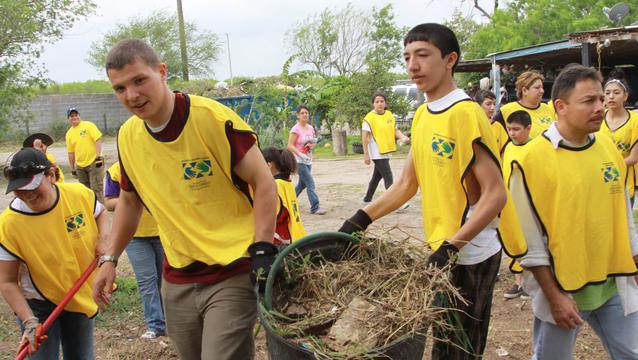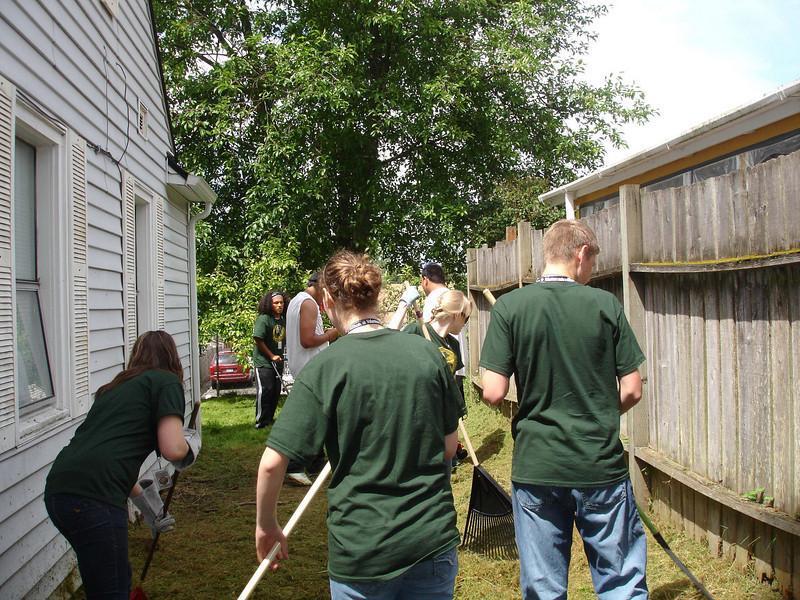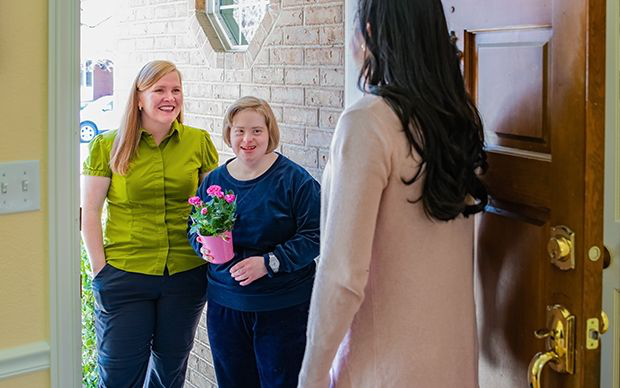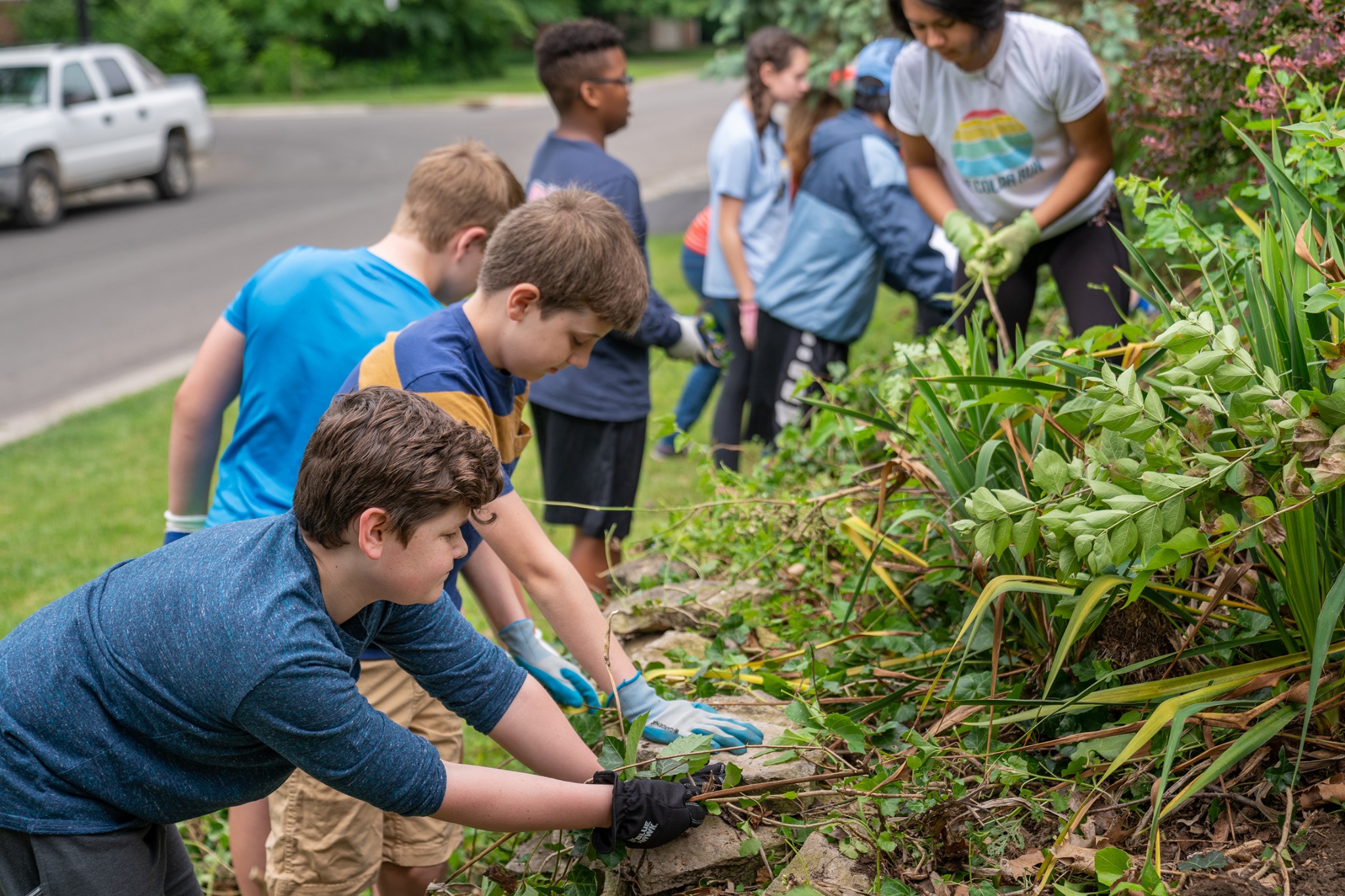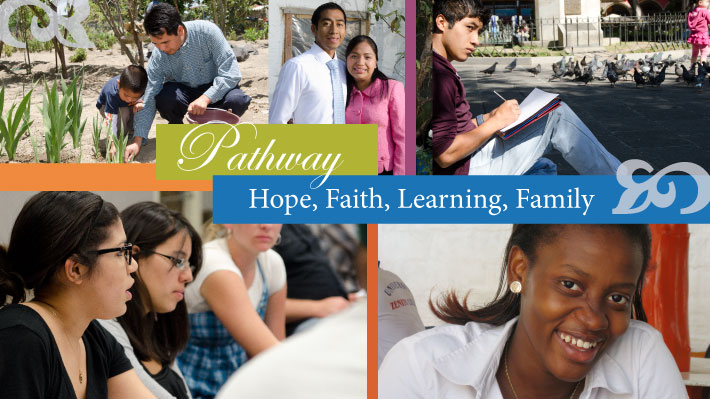Template:Humanitarian Aid Updates
"Caring for those in need is both a duty and a joyful privilege for followers of Jesus Christ. As members of The Church of Jesus Christ of Latter-day Saints, we commit to living the two great commandments: to love God and to love our neighbor (see Matthew 22:37–39). As a Church, we are blessed to have the ability, global connections, and resources to follow His admonition. . .. We invite all to join in being 'anxiously engaged in a good cause' as we continue to strengthen one another through service (Doctrine and Covenants 58:27). - First Presidency of The Church of Jesus Christ of Latter-day Saints
Contents
We Love God and We Love Our Neighbors
Caring for those in need has been the core mission of The Church of Jesus Christ of Latter-day Saints from the beginning. In 1842, the Relief Society was organized with a charge to care for the poor and minister to their needs. In 1936, the Church created the welfare program to help care for members in need and strengthen their ability to become self-reliant. And in 1985, the Church’s global humanitarian outreach was formally initiated.
President Russell M. Nelson has taught us that they who are willing to be called the Lord's people "are willing to bear one another’s burdens, . . . to mourn with those that mourn; . . . and [to] comfort those that stand in need of comfort."
Members of the Church have a covenant commitment to live the two great commandments: to love God and to love our neighbor. The Lord has commanded us to "succor the weak, lift up the hands which hang down, and strengthen the feeble knees" (D&C 81:5). As followers of Jesus Christ, members of The Church of Jesus Christ of Latter-day Saints heed the Savior's call to feed the hungry, give drink to the thirsty, take in the stranger, clothe the naked, and visit the sick and afflicted.
Church members seek out those in need and render aid to all of God’s children without regard to religious affiliation, race, or nationality. As they do so, they are reminded of the Lord's admonition when he taught, "Verily I say unto you, inasmuch as ye did it not to one of the least of these, ye did it not to me" (Matthew 25:45). King Benjamin in his timely treatise as recorded in the The Book of Mormon also reminds us, "When ye are in the service of your fellow beings ye are only in the service of your God" (Mosiah 2:17). King Benjamin also exhorted, "And now, if God, who has created you, on whom you are dependent for your lives and for all that ye have and are, doth grant unto you whatsoever ye ask that is right, in faith, believing that ye shall receive, O then, how ye ought to impart of the substance that ye have one to another" (Mosiah 4:21).
Those Who Give and Those Who Receive Are Equally Blessed
The two great commandments teach us that we are loved by God and our neighbor. Both the giver and the receiver are blessed as they strengthen one another. As part of the Lord's way to provide for His children, Church members are blessed with an opportunity to fast for a 24-hour period each month and generously donate the value of the meals missed for the benefit of those in need. Local leaders use these funds to help meet needs for food, clothing, housing, or other necessities within their congregations and communities. In addition, all the resources available to the Church to help those in need are called the Lord's storehouse. These include members' offerings of time, talents, compassion, materials, and financial resources.
- I believe that for every disciple of Jesus Christ, this is part of our DNA, that we go and find those that are in need and try to help them, whether it is in our own community or far away in other countries. This is really at the center of our religion. — Bishop Gérald Caussé, Presiding Bishop
In 2021, The Church of Jesus Christ of Latter-day Saints participated in 3,909 humanitarian projects, with 6,800,000 hours of service volunteered, and 188 countries and territories served. Volunteer service was rendered through various means such as: (1) Service at Church Facilities, such as farms, orchards, canneries, Deseret Industries stores, and more; (2) Missions to Care for Those in Need, including volunteer service in 85 countries around the world; and (3) Church-Sponsored Community Service Projects, including cleanup after natural disasters. In addition, JustServe facilitated over 41,000 volunteer projects (including 21,500 new projects).
A total of $906 million was expended to help those in need through:
- Fast Offering Assistance, which provides temporary financial help to those in need.
- Bishop's Orders For Goods, including giving food and commodities from bishops’ storehouses and Deseret Industries stores to those in need.
- Humanitarian Projects, including charitable relief in communities across the world.
- Donated Commodities, including Church-produced goods provided to communities through food banks and other agencies.
- Donated Clothing, including discounted or free apparel given to Deseret Industries.
- Church Operations, including Family Services counseling, employment centers, farms and food-processing facilities, and Deseret Industries.
To help as many people as possible, the Church has established various humanitarian projects which operate throughout the world. These programs include LDS Charities, Helping Hands, and LDS Philanthropies. The Church also maintains the Latter-day Saint Humanitarian Center in Salt Lake City, Utah, which was established in 1991 to "prepare humanitarian supplies for use worldwide and train those desiring to develop employable skills to become self-reliant."
Ministering to Those in Need
Sister Jean B. Bingham, Relief Society General President has taught, "Sometimes we think we have to do something grand and heroic to 'count' as serving our neighbors. Yet simple acts of service can have profound effects on others—as well as on ourselves." Elder Jeffrey R. Holland, of the Quorum of the Twelve Apostles, has taught, "Ministering looks different from person to person and is highly individualized. Members are encouraged to prayerfully seek guidance from the Spirit to know how to meet the needs of those to whom they minister."
During His earthly ministry, Christ was the Great Exemplar in showing us how to love and serve others. As members of the Church minister to those around them, they strive to follow the example of the Master Teacher. In addition to carrying out ministering assignments and meeting the immediate needs of others within their own communities, members of the Church strive to be more Christ-like through random acts of kindness.
Service is a core pillar of their beliefs— both as an organization and as a people. Like Jesus Christ, members of the Church strive to bless the lives of others through unselfish service. Like the Good Samaritan, they believe the definition of "neighbor" extends beyond those in their immediate vicinity. They are willing to help anyone in need regardless of their location, race, nationality, gender, or religious and political beliefs.
Some examples of types of service that members have rendered include:
- In Bolivia, the Relief Society sisters of the Los Andes Stake collected 34,000 plastic caps to support the Niño Feliz initiative, which helps low-income children with cancer receive chemotherapy treatments.
- Members of the Khovd Branch in Mongolia visited their local Violence Victims' Shelter to donate warm blankets, newborn supplies, and hygiene kits.
- Sister Curriden, a volunteer at the welcome center for The Church of Jesus Christ of Latter-day Saints in east Las Vegas, and her husband serve their community by helping people who have recently immigrated find access to legal services, improve their English, and work on paths to citizenship, so they can obtain better jobs and improve their lives.
- Members of the Erima Ward in French Polynesia collaborated with the city of Arue to set up a training course to help community members to learn how to sew. This allowed the participants to produce clothes for themselves and baby blankets for new mothers.
- In both South Korea and Canada, members worked to deliver fans, air conditioners, and other necessities to the elderly. These supplies made a significant difference in the comfort and safety of vulnerable seniors, many of whom were isolated due to COVID-19 restrictions.
- In Layton, Utah, a local Relief Society leader coordinated with the St. Mary Ethiopian Orthodox Tewahedo Church of Utah to serve together on the 9/11 day of service. Members of both congregations assembled more than 10,000 food packs for local schoolchildren while establishing friendships between the two groups.
- In Schaumburg, Illinois, volunteers converted a church building into an approved food processing facility so they could package and distribute food to those in need. After posting the opportunity on JustServe, the project received 356 volunteers from multiple faiths, who packed 85,538 meals. The effort will feed 234 children in Haiti and the Philippines for an entire year.
Members can get actively engaged in humanitarian efforts in several ways. One way that members can become involved is through service in their local community. Service in the community can include things such as cutting a neighbor’s lawn, washing a neighbor’s car, offering to run errands for an elderly person or someone who is otherwise unable to do so themselves, or babysitting for a neighbor. Service in the community might also include taking part in projects that benefit the community. Members should also seek to build community relations by being actively involved in community service projects that may be spearheaded by people of other faiths, or if they identify something that would benefit the community that has not been addressed, they should take the initiative to bring about a solution. No matter how a person chooses to serve his community, and no matter how small the service may seem, the service alone will say myriads about that person and his or her faith.
Adriana, the communication director for the Montreal Quebec Stake, summed up the willingness of members to serve by saying, "We can make a difference in a person's life by following the example of our Lord Jesus Christ and reaching out—safely—to those in need; for we know well that it is 'by small and simple things that great things are brought to pass'"(see Alma 37:6). In the words of King Benjamin from his timely sermon as recorded in the Book of Mormon, "For behold, are we not all beggars? Do we not all depend upon the same Being, even God, for all the substance which we have, for both food and raiment, and for gold, and for silver, and for all the riches which we have of every kind?" (see Mosiah 4:19).
The Youth of Zion Also Render Service
President Russell M. Nelson has said, "[Our youth and children] have the capacity to be smarter and wiser and have more impact on the world than any previous generation!"
It is for this reason that children and youth of The Church of Jesus Christ of Latter-day Saints are also encouraged to engage in service and be active in their communities. They are given opportunities to plan service activities and choose the goals and projects they want to work on with the help of adult leaders and family members. The activities that they participate in are designed to help them grow to be more like the Savior and develop socially, spiritually, physically, and intellectually.
On 11 September 2021, youth from 40 stakes in the United Kingdom and Ireland participated in a day of service. Activities ranged from collecting and delivering supplies for food banks to making flash cards to help people who are refugees learn English.
Also in 2021, many youths around the world participated in the Church's Light the World with Love campaign. As part of the initiative, adult leaders in Ecuador taught young women how to knit, and they were able to make 43 scarves in three months for their local nursing home.
In addition to activities organized by the Church, families are encouraged to plan service opportunities at home. For example, five-year-old Preston Andrews in Alberta, Canada, came up with the idea to organize members of the community to clean up trash strewn fields by their home. His four siblings helped him carry out the project.
The Church’s Self-Reliance and Humanitarian Initiatives
Some members choose to devote even more of their time to humanitarian work by serving a fulltime welfare and self-reliance mission. These devoted volunteers fill a variety of roles within the Church’s self-reliance and humanitarian initiatives. They may provide employment coaching, help those in need to transition to more stable living environments, supervise humanitarian projects, and even manage Church-owned farms and other facilities.
In southeast London, Elder and Sister Miller served at the Church's Friendship Centre, which aims to help individuals who are fleeing war, persecution, and natural disasters. The Millers coordinated volunteers, local government agencies, and other nonprofit groups to help these vulnerable individuals meet friends, learn skills, connect with counseling and legal assistance, and work toward integration in their new community.
In Laie Hawaii, Elder and Sister Ellingson managed the Church-owned Laie Hawaii Farm, where over 310 families grow crops to support their households. The Ellingsons helped clear land, prepared soil for planting, and taught basic farming skills. Their work helped many food-vulnerable people in Hawaii to support themselves during a time when jobs have been scarce due to the COVID-19 pandemic.
Similarly, Elder and Sister Brock collaborated with Taiwan Technical Mission and the Ministry of Environment and Land Development in Kiribati to help residents learn how to grow nutritionally rich, sustainable gardens. One aim of this effort is to promote dietary practices that will help decrease the incidence of diabetes.
The Church also facilitates self-reliance programs and resources to help individuals find employment, become financially secure, gain educational opportunities, and build emotional strength. These efforts are aided by missionaries and other volunteers, who facilitate self-reliance groups and employment coaching in 144 countries worldwide.
For those who struggle with barriers to employment, development counseling is available through Deseret Industries. This program helps individuals to make goals and to determine a plan to get the education and experience necessary to achieve those goals. As part of the program, participants receive training and real-life work experience in Church-owned thrift stores.
The Church's Family Services organization helps leaders care for individuals with social and emotional challenges by providing resources and consultation. One important focus for Family Services is the Church’s Addiction Recovery Program (ARP), which provides support and a safe place for anyone working to overcome a compulsive behavior. The free program is made up of support groups that follow a 12-step approach. The program is built within a gospel-centered framework that connects with the Savior Jesus Christ and recognizes Him as the source of healing. The Addiction Recovery Program is facilitated by ARP volunteers around the world, and anyone—regardless of their religious belief—is welcome to participate. In addition to ARP services, Family Services offers counseling to people in a variety of circumstances. They also conduct family, group, and marriage counseling sessions.
Emergency Response is the part of the LDS Church's humanitarian efforts of which most people are aware. Funds and supplies in this area are used to help victims of natural disasters such as earthquakes, floods, droughts, tornadoes, and hurricanes, as well as other disasters such as wars or political unrest. Supplies in this area are gathered and stored before a crisis so supplies can be sent within hours of an emergency. Volunteers are also on call so they can be reached and organized within a few hours if needed. The LDS Church is renowned for its ability to organize its members in various regions of the world to respond to emergency and facilitate distributing goods immediately after a crisis, often before aid programs such as the Red Cross or the Salvation Army come to assist.
President Russell M. Nelson has said, "It would be impossible to calculate the amount of service that Latter-day Saints render around the globe every day of every year." President M. Russell Ballard, acting president of the Quorum of the Twelve Apostles adds, "When we serve together, we realize that our similarities are stronger than our differences." And Sister Sharon Eubank, first counselor in the Relief Society General Presidency, has said, "Our individual efforts don’t necessarily require money or faraway locations; they do require the guidance of the Holy Spirit and a willing heart to say to the Lord, 'Here am I; send me.'"
You can read the full "Caring For Those In Need" 2021 Annual Report online.
Self-Reliance Includes Education and Employment
Through BYU-Idaho, the Church has initiated its Pathway program to offer higher education to people all over the world. The unique structure of this program not only holds costs way down, but it also offers certificates on the way so that the earning power of the students increases as courses are completed.
Senior missionary opportunities in the Church include mentoring students all over the world, holding costs down.
The Church of Jesus Christ of Latter-day Saints also offers self-reliance courses in starting and growing a business, personal finance, finding a better job, education for better work, and emotional resilience. The personal finance course has been adapted by the NAACP to help inner city Blacks improve their standard of living.
